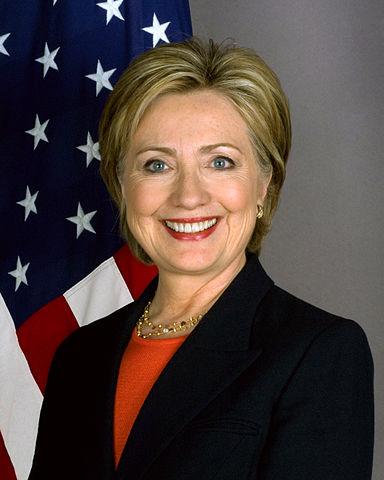
Hillary Clinton
“I can’t believe we just put the biggest crack in that glass ceiling yet,” Hillary Clinton said on July 27th, acknowledging her historic presidential nomination during the Democratic National Convention (DNC) in Philadelphia.
“This is your victory,” she continued. “This is your night. And if there are any little girls out there who stayed up late to watch, let me just say I may become the first woman President. But one of you is next.”
Though Hillary is right that her victory is not just personal, but also a victory for women across the country, we also need to look at the way this achievement was thwarted for years — specifically, the impact of incessant sexism on her campaign.
Looking back to 2008, it’s clear that Clinton’s first campaign was characterized by the “bitch and ditz” stereotypes that dichotomized Sarah Palin and Hillary Clinton. New York Magazine stated that the 2008 election cycle had actually done more to “reinforce the two most pernicious sexist stereotypes and actually set women back” than it did to break down our nation’s sexist perception of women in politics. While Palin represented the “sweet and nurturing” female stereotype the media is accustomed to presenting, Clinton was vilified as “the bitch” — a title that implies power but actually decreases her likability. Media coverage of Clinton (especially cable news coverage) reinforced this with sexist remarks, from Glenn Beck describing Clinton as a “stereotypical bitch” to Tucker Carlson stating, “When she [Hillary Clinton] comes on television, I involuntarily cross my legs.”
This sexism has continued throughout Clinton’s 2016 campaign. Throughout this election, political commentators and journalists have zeroed in on the sound of Clinton’s voice, describing it as “unpleasant,” “angry, bitter, screaming.” Hillary’s likability (or lack thereof for some voters) tends to come up in political conversations, which many see as illustrative of our society’s distrust of ambitious, political women who fail to comply with traditional gender roles. We use gendered language in regards to Clinton, including words like “shrill,” or “bitch,” and others, like “loud” or “untrustworthy,” seem to be applied more to Clinton than the other candidates. Perhaps as a result of this rhetoric, 60% of voters say they “don’t trust Hillary.” Of course, there are plenty of complex reasons for the associations between Clinton and these words, but it seems undeniable that at least one of the reasons is her gender.
It’s not just the media who have reinforced these gendered associations, either. At the Republican National Convention, many speeches bashed Hillary for being a liar, including those of Paul Ryan and Chris Christie. The anti-Hillary rhetoric that has been increasingly prominent throughout Donald Trump’s campaign and among his supporters since he was awarded the Republican nomination has been undeniably sexist. One Trump supporter, for example, even wielded a sign with the words “TRUMP VS. TRAMP” on it.
Even after Hillary accepted the nomination at the DNC, many newspapers — including The Sacramento Bee, Houston Chronicle, and The Buffalo News — ran photos of her husband and former president Bill Clinton on the front page accompanied by an article about Hillary’s historic victory. Amazingly, they failed to see the irony of using Bill’s photo to document a monumental moment for women in the United States.
Hillary Clinton is not the only politician who has been treated unfairly by the American populus. I have watched sexism in politics play out on my TV screen for years now. As a high school senior exploring what career paths I might take, it is daunting to realize that we still unfairly chastise women for even the most basic, non-consequential actions (i.e. having a ‘shrill’ voice, or wearing a ‘bad’ outfit). If any of my friends or I were to enter the political sphere, we could be labelled as either too bossy and aggressive or too submissive and passive. Although I grew up in a rather progressive environment that taught me that I could do anything I set my mind to, this election cycle has reminded me that while my gender may not inhibit my abilities, it may still alter the way other people perceive my actions.
No matter where one stands politically, I hope discussing the way Clinton has been treated due solely to her gender will help us recognize how detrimental such sexist attitudes are on future generations of young girls who aspire to become politicians or any other positions of power. Hopefully, we will see a decrease in the sexist language and rhetoric against future female candidates and instead see more of a substantive argument between Democratic and Republican candidates.

